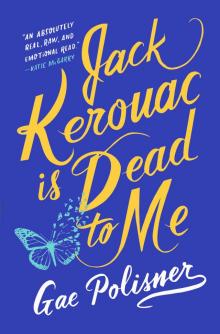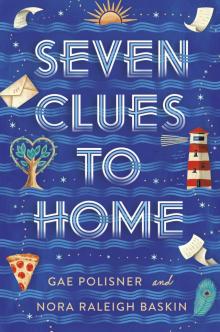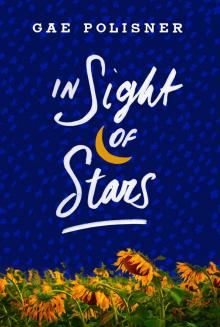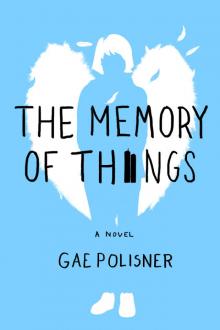- Home
- Gae Polisner
Jack Kerouac is Dead to Me Page 2
Jack Kerouac is Dead to Me Read online
Page 2
“Wait till you see them hatch,” I say. “They’re ridiculously pretty. And these,” I add, holding out the cup with the Glasswing larvae, “the chrysalises are this amazing iridescent, neon green, like a gemstone, and the butterflies are totally transparent.”
“Like glass,” you say, and I can’t tell if you’re being sarcastic. You tip the culture cup you’re holding at me, and think for a second. “And these? Why are they called Jezebels, anyway?” Panic rises in my chest before I even know why, because there’s something in your voice, something cruel, even if you’re pretending the question is innocent. It’s as if you’ve been waiting to ask it. “Jez-e-bels,” you repeat purposefully, emphasizing all three syllables.
“I don’t know, Aubs; why?” I swallow hard. “Why would I care?”
“No reason. It’s just, I asked my mom one day, because you had been talking about the butterflies, you know, ‘Jezebels this, and Jezebels that,’ and she was watching one of those old black-and-white movies she loves, and when the commercial break was over and the title came on—get this—guess what it was called?”
“Jezebels,” I snap back, annoyed.
“Jezebel, singular, actually. But, I mean, what are the chances of that?”
“I have no idea,” I say.
“Anyway, I asked my mom what the film was about, because it’s such a coincidence, right? And she said it was about this skanky Southern belle who everyone thinks is a whore. Because that’s what a Jezebel is, JL. A Jezebel is a whore. And it’s just kind of odd that, of all the butterflies you could have picked—”
My eyes shoot to you, my throat lodging with tears. “We both know your mother didn’t say that,” I challenge, because there’s not a chance in hell Mrs. Andersson used any of those words.
“Not directly … but she made it clear.” Your eyes laser focus on me and you add, “I’m trying to help, JL. That’s all I’m doing.” You shift your gaze from me to Max, and back to me. “Like, you know he’s nineteen, right? And not exactly—”
“Of course I do!” I cut you off. “You’re being stupid is what you’re doing.” I fight to keep my voice from breaking. I don’t want to give you the satisfaction. Besides, Max and I haven’t been dating that long. We haven’t done much. I haven’t done anything. “Why don’t you go, Aubrey?” I say, standing. “It’s obvious you don’t want to be here.”
You stand, too. “I’m just saying, JL, if you talk about them in public—the butterflies, I mean—the name is kind of suggestive. So, maybe don’t call them that, is all.”
“Noted.”
You move to my bedroom door, and I hold it open for you, half-hoping you’ll argue, say you’re sorry, that you really want to stay. You hover there, wordless.
“All set, Jailbait!” Max exclaims too loudly, before yanking his earbuds out and tossing them onto my desk. He stands, nearly knocking my desk chair over with his strong, solid body, and stretches, causing his white T-shirt to ride up, revealing the edge of a sleek black motorcycle tattoo peering from the waistband of his jeans. I’ve traced my finger along its outline, asking questions, but all I really know is that he put it there, hidden, because his dad would “kick my ass otherwise.” He turns to me and says, “One deluxe butterfly habitat, fully assembled, though it wasn’t much more than screwing a few screws.”
(I feel your eyes bore through the back of my head.)
Max kicks the cardboard and Bubble Wrap away from the leg of the chair with his work boot–clad foot, and places the multi-level habitat on the floor. He scans the room, confused, and raises his eyebrows at my open door, but I don’t turn.
“What happened?” he asks. “Where’d she go?”
I don’t answer.
It’s better at this point if you’ve gone.
SEPTEMBER
FIFTH GRADE
1. Always be friends.
2. Never fight.
3. Never ever date a boy the other person likes.
4. Never keep secrets from each other.
You put your pen down.
“Anything you want to add?” you ask.
MID-APRIL
TENTH GRADE
My cell phone buzzes from my desk, next to the dead, splinted Jezebel and my closed, unhelpful laptop.
“Shut up,” I say, as it vibrates against the wood, but what if it’s Max?
I still can’t bring myself to answer it.
I close my eyes. Poor, dead butterfly.
From the larvae that shipped, only half survived through the fifth and sixth instar phase, and of those, only seven butterflies had emerged from their beautiful chrysalises. Three Glasswings and four Jezebels, that’s it. I had already felt like a failure, and now one of the Jezebels is dead.
Aubrey would be pleased. Not including me, one less Jezebel in the world.
My phone buzzes again—this time a brief, single message alert—so I force myself over to my desk to clean up. But when I get there, the butterfly is upright, her wings folded back and her antennae poking about in the air.
I know she’s only a butterfly, but I’m so happy I could cry.
I watch, overwhelmed, as she crawls to the edge of my desk, her proboscis dipping, her wings preparing for flight. She takes off, circling the room a few times before she lands on the habitat, next to the orange slice I placed there.
I give her a moment to drink, before lifting her with the fruit and slipping her carefully back inside.
On my cell, the message is from Dad. My chest tightens. What if he’s changing his plans? I dial him back, my heart sinking, but it rings four times, and goes to voicemail.
Maybe that’s best. Maybe I don’t want to know.
The front door opens. I hear Mom move through the house, talking to herself, or to no one.
I lock my door, and sit in front of the habitat to collect my thoughts. My mother’s footsteps move toward me down the hall, but they stop short of my room, and there’s the sound of the bathroom door closing.
The shower runs. Good. I just want to stay here with the butterflies.
I watch the Jezebel scale the mesh, her colors flashing me as she moves to a perch and takes flight.
I did this.
I fixed her.
If only I could fix my mother so easily.
EARLY MARCH
TENTH GRADE
“Your mother will be fine. Let’s buy butterflies!”
It’s after one of our Sunday dinners that Nana suggests this. Mom has been acting weird all night. Not eating, staring off blankly in the middle of a thought. Slinking off to bed with talk of a migraine. Nana, per usual, is pretending everything is normal, head firmly planted in the sand.
I’d gone to the sink to help with the dishes, but she had shooed me away with a wave of her hand.
“I’ve got these,” she’d said, sinking yellow-gloved hands into soapy water. “You go get your homework done so you don’t end up like your boring old nana, cooking and cleaning without a thing of your own in the world.”
Nana is wonderful—supportive and doting—but she can be infuriatingly old-fashioned and oblivious. Maybe because she never worked, and never had to, having married my pop-pop so young. He owned a shelving business that kept them comfortable, which she sold to a big closet company for a decent amount of money after he died. Kind of how Dad sold his vitamin company to the big conglomerate in California. But Nana acts like she had no options when she had plenty. After all, Aubrey’s grandmother is an accountant at a fancy firm, and my friend Tanya’s grandmother was my pediatrician in middle school. But I give Nana leeway because with Dad still away, and Mom acting weird, she’s the only adult I can count on.
In the living room I try to focus on my homework, but I’m distracted by thoughts about Mom, about Max Gordon, about Dad coming home, finally, he promises, in May. And, by the time Nana emerges from the kitchen, I’m perusing an online catalogue called World of Butterflies.
“Oh, my! Would you look at these!” Nana says
, sitting next to me, clearly not annoyed that I’m procrastinating. “Are they real? What are they?”
“Yes, real,” I say, clicking on the next close-up photo of a butterfly, transparent except for the wine-colored veins in its wings, as if it is made of stained glass. “Scientific name, Greta oto. More commonly known as a Glasswing.”
I’ve been eyeing the Tropicals for months, ever since the second batch of Swallowtails and Monarchs I raised and set free in our yard last summer. The varieties are endless, so pretty they make me hyperventilate. At first, I thought I might try my hand at the Blue Morphos, but their life-span is short, and I can’t bear the thought of them, all majestic like that, lying at the bottom of a habitat. So, instead, I’ve been looking at Glasswings, and a few others with longer lifespans.
“Glasswings, of course! That’s exactly what they look like,” Nana says, running her finger across the screen. I’ve told her a hundred times how it’s bad for the computer, but I don’t stop her. “They’re quite stunning, aren’t they? Shall we get some?”
“They’re too expensive,” I say. “They ship from the UK. And they don’t even live here. It’s too cold. They’re tropical, indigenous to Chile, Mexico, and Panama. They’ve also been spotted in Texas. But not here. They don’t belong here. There’d be no setting them free in our backyard. I’d need equipment. Lights. Plants. A way bigger habitat…”
“Don’t you sound smart on all this,” Nana says.
“I’m trying.” I say. “I’m learning.” And I am.
So far, I’ve only raised the common brushfoots and Swallowtails that came in the basic Butterfly House Kit Dad had given me before he left for LA, ones I’d set free the moment they emerged. These—the Tropicals—would be a lot more complicated.
“In that case, how about an early birthday present?” Nana asks, making me laugh. My birthday isn’t until the end of June.
“Nana, that’s months from now.”
“Well, we’ll have to get you something then, too. After all, a girl should have something truly special and beautiful when she turns sixteen.”
I click to change the image on the screen, anything to distract Nana from talking about my birthday. Lately, she goes on and on about me becoming a woman, making me sure she’s trying to hint something awkward about Max and me. She barely knows him, only that we’re dating, and I haven’t told her or Mom that he’s a senior, or worse, that, since he was held back, he’s already nineteen. Nana would have a stroke.
“Look at these,” I say, stopping on a page full of Painted Jezebels. “These are my favorites,” I tell her.
In the end, Nana chooses the Glasswings, Greta oto, and I choose the Painted Jezebels. Delias hyparete metarete, indigenous to Sri Lanka, India, and Southeast Asia.
The Glasswings are prettier, for sure. But I like the Jezebels with their plain white moth wings on top, their vibrant reds and oranges hidden underneath like a secret.
MID-APRIL
TENTH GRADE
I watch the splinted Jezebel for a few minutes more to be sure she’s really okay, before heading down the hall toward Mom’s bedroom. I haven’t heard a sound since she got out of the shower. But she’s not in there; her bed is made up, no slight swell of the covers. Apparently she hasn’t given up for the night yet.
A spark of hope flares in my chest. Maybe she’s up doing something normal, cooking dinner in the kitchen for a change.
“Mom?” I call out. Maybe today with Dr. Marsdan was the magic session, and her therapy will have finally helped things. Maybe this new cocktail of medications is working.
At the entrance to the kitchen, hope deflates.
She sits with her back to me, in one of her dumb kimonos, her shoulders moving slightly, the sound of a pen scratching along an unseen sheet of paper.
She’s writing one of those stupid letters. It would have been better if she were sleeping.
“Mom?” I have a hard time keeping the fear from my voice. “Mom.”
She jerks her head around, her black tangle of hair whipping across her face. Her cheeks are wet. She’s been crying. The sides of her short silk kimono—this one fuchsia with embroidered burgundy flowers trailing down the hem—fall open, revealing too much of her chest.
She looks at me, but doesn’t see me.
I swallow hard and try again, louder, more forcefully. “Mom!
I told Nana she does this—disappears completely—and Nana says she asked Dr. Marsdan about it, and he said the trick is to re-ground her. “Give her facts that might pull her back to the present. She needs a little help focusing, that’s all,” Nana insisted.
Right, whatever.
“When did you get home?” I ask, trying. “Were you out shopping, or did you have an appointment with Dr. Marsdan?” Mom stares past me, eyes damp and distant. “Mom, was Nana with you?”
“What?” Her voice is soft, her question directed somewhere other than me.
“Mom. I’m asking you about today. Did Nana take you to your appointment with Dr. Marsdan, or did you go alone?”
With that, she snaps back, a mix of recognition and confusion playing across her face. “Oh, Jean Louise, yes. That’s right. Nana, yes. She has her bridge group this evening. She went with me, but couldn’t stay.”
Okay, then.
Mom turns away again, sighs deeply, and folds the piece of paper on the table, jamming it into her pocket.
I look around our otherwise pristine kitchen, devoid of any cooking or baking or other culinary endeavor that might amount to a meal resembling dinner, and back at my mother. She’s grown thinner these past weeks. The kimono hangs large at her shoulders.
Amidst the swirl of flowers is an embroidered symbol. It matches one my father sent me when he first moved out to Malibu. It’s the Japanese symbol for patience. I could use some of that right now.
“Mom?” I say, and she turns. “We should order something for dinner?”
“Yes. Yes. Of course we should. Could you call? Get me whatever you’re having. I might need to rest for a bit.” She heads to her room, leaving the pen, but taking the letter with her.
I think about calling Nana. At least last week Nana finally admitted that the doctor says Mom might have something seriously wrong with her. Something called dissociative disorder, which can cause both delusions and hallucinations. “It’s only stress,” Nana had added, reassuring herself, because she sure wasn’t reassuring me. “Nothing to worry about, really. She’ll be fine when your father gets home.”
But what if she isn’t?
And what if Dad never comes home?
Here’s what I’ve learned, Aubrey: If a person is crazy but beautiful like my mother, they get away with it.
If they’re rich and beautiful, even better.
Sure, maybe people talk behind their backs, hint and whisper, but mostly, they excuse it, or laugh it off. No one believes it. Or at least they don’t see it for as serious as it is.
Take Lindsay Lohan or Shia LaBeouf, for example. Take Demi Lovato.
And, let’s face it, my mother has always tended toward the dark and dramatic, the kind of person who has dancing-around-the-room highs, and crash-and-burn lows. Even when we were younger, you and I would say how weird she could act. Dad used to call it “free spirited.”
“She’s spontaneous!” you’d tell me. “Way better than my mom, who can’t even sneeze on a whim.” And, yeah, compared to your mother, with her crisp suits and white blouses, and endlessly booked schedule, my mother could be refreshing with her wild hair and bohemian clothes. She could be fun and exciting, but also mortifying, and not very parental, which, it turns out, only seems like a good thing, until it isn’t.
But whatever you wanted to call it—her—before Dad left, after he left, she deteriorated.
No, worse than that, Aubrey. She unraveled. And not even Nana noticed how bad.
And somehow, you held that against me. As if I had any control over my mother …
I guess what I’m trying to say is,
maybe if people saw beyond her beauty, they would have done more than gawk or roll their eyes when she whirled into the kitchen (or across the front lawn, or through the mall, or the bank, or the grocery store) laughing (or crying) in her hot-pink (or electric-blue, or mandarin-orange) kimonos which she had taken to wearing like street clothes. Heads turned, for sure, but nobody thought they should help her … Nobody thought they should try to help me.
God, even I loved those kimonos at first, remember, Aubrey? The matching turquoise ones Dad found in some little store on the beach in Malibu. “They were calling your names,” he told us. “Real silk, for both of my butterflies.”
He still calls me that, Aubrey, his butterfly.
If only I could ever feel like one.
EARLY SPRING
NINTH GRADE
“Wait, why do you have that on, Mom? It’s freezing out. Seriously.”
Mom drops her keys and handbag on the kitchen counter, and sits with her back to me, head in hands. She wears the turquoise kimono Dad sent, with flip-flops, which she apparently wore to take Dad to the airport early this morning, for his flight back to LA.
“I didn’t get out of the car,” she says, as if this makes it better.
It’s nearly noon, and I’m groggy and upset that I overslept and she didn’t wake me to say goodbye. At least he’ll be home for good soon. He’s been in LA for four months, so that means he only has two more to go. Six months gone altogether. “With one option period, two in a pinch. But not likely, so I wouldn’t worry,” he had reassured.
“Are you okay?” I ask her.
She turns to me, her eyes red and puffy from crying. “Should I be?”
“Mom, it’s two more months, that’s all. It will go fast. We’ll be okay until he comes back.” I’m trying to comfort her, even though it should be the other way around.

 Jack Kerouac is Dead to Me
Jack Kerouac is Dead to Me Seven Clues to Home
Seven Clues to Home In Sight of Stars
In Sight of Stars The Summer of Letting Go
The Summer of Letting Go The Memory of Things
The Memory of Things The Pull of Gravity
The Pull of Gravity